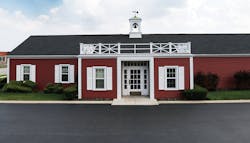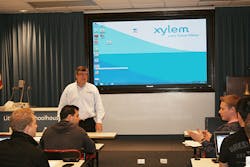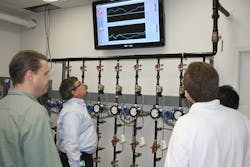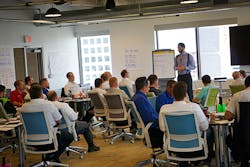There is a sage adage circulating the trades that goes something like this: “What if we train our employees and they leave? But what if we don’t and they stay?” That speaks to the power and value of good training. Think about that for a moment. It is more valuable to have trained employees with the possibility of them leaving the company one day than having the untrained stay and potentially hurt the company.
CONTRACTOR magazine recently talked with some of the top trainers in the plumbing and heating/hydronics industry about the value of training, what they offer and their own unique styles.
Shining Star
With more than 550 member companies, Nexstar Network, St. Paul, Minn., is a business networking organization that delivers comprehensive business training, proven business systems and dedicated business coaching to independent home service plumbing, heating, air conditioning and electrical professionals. Director of training, Keith Mercurio, a former plumber, has a unique and somewhat humble view of the training process. “Any trainer who tells you that their class is life changing … the trainer is not a life changer.”
According to Mercurio, Nextar’s participant-centered methodology helps participants learn. While the message is enlightening, fun and passionate in a way that suits them, “They are responsible for training each other, which is popular and effective,” says Mercurio, who believes that the training begins with a two-pillar approach that consists of belief and behavior. “Establishing belief, and demonstrating and creating confidence to behave in that particular process is key,” says Mercurio.
One of the most powerful messages Mercurio conveyed was, “Contractors need to ask themselves, ‘Would you want your customers to watch your training?’ You want your training to be effective, with a backbone of integrity and transparency.”
The proof is in the numbers — companies that use the Nexstar training program, says Mercurio, experience 18% sales growth and 11% net profitability year after year.
PHCC — Involved Contractors
PHCC and the PHCC Educational Foundation exist to make contractors more successful in their work. “By providing that education, training and the networking opportunities to allow learning from peers, we can open up that door to having a successful business,” says John Zink, PHCC Educational Foundation Vice President of Education and Programs.
Training in our industry is frequently used as a marketing tool to sell more of a specific product or service, says Zink. “In our case, the education is the product we are selling — or often giving away at no cost. We are interested in sharing the best practices, the best advice or the best lessons learned, without an agenda attached,” says Zink.
In addition, much of PHCC’s training is based on contractor feedback and direct input in its development. For example, the apprentice training textbooks were written only after asking contractors exactly what they would need for an apprentice to know before they hit a job in their first year, their second, etc.
The seminars to be held at the PHCC CONNECT conference in Milwaukee this October were selected from topics that contractors said they wanted to learn about. “Deeply involving contractors as the subject matter experts in the development of our training means that our customers are building the education they want, instead of us creating something and then trying to sell it to them,” adds Zink.
School’s in Session
At Bell & Gossett, training and education has been one of the cornerstones of the company for the last 60+ years with its Little Red Schoolhouse. Xylem’s Bell & Gossett Little Red Schoolhouse is an accredited provider by the International Association for Continuing Education and Training (IACET), and has been approved by the Green Building Certification Institute (GBCI) as a provider of continuing education for LEED professionals. The Little Red Schoolhouse offers different seminars based on the experience level of the attendees.
Pioneers Bob DeWyze and Roy Ahlgren blazed training trails through their approach and today the torch has been handed to Larry Konopacz, senior manager of training and education. “In my approach, I explain the topics and help people understand the why, and I try to keep it layman’s terms so people are able to follow along,” says Konopacz. “Instead of looking at PowerPoint presentations, we thrive using hands-on applications and working demos,” says Konopacz.
“We also expand trainees’ knowledge when we talk about the entire system,” says Konopacz, “As soon we talk about the system, it immediately grabs their attention.”
Konopacz stresses that with training, “the payback is many times over through troubleshooting, designing and recognizing issues before they happen.”
Comfort First
Over at Taco Comfort Solutions, with training gurus John Barba, David Holdorf and Rick Mayoh, the message is quite simple, “I want people to be as comfortable in their own home as I am in mine,” says Holdorf, residential trainer, Eastern Region.
With the furnace market the biggest competitor to the hydronics market, the mission statement needs to be emphasized, says Holdorf, “We need to help grow the hydronics industry; we need to maintain what’s there and teach the virtue of hydronic heating.”
NATE and NORA certified, and application-based training — not necessarily about products, “We talk about systems and then how products fit into them. We teach not only the technical side, but doing what’s right for the customer,” says Holdorf.
Barba has reiterated, “Without solid information the program is kind of useless, so you start with that. The attendee has to leave with information that can be put to use the very next day in someone’s basement. Without that, the program is a failure.”
How the presenter delivers that information, says Barba, is the key, and how they do that is as unique as the person doing the presenting. “People like to be talked with, not lectured, and they like to be an active participant, not a passive observer. There are lots of ways to make this happen — but they’re all techniques. The information is the most important part,” says Barba
In 2012, Taco opened its Innovation and Development Center at its HQ in Cranston, R.I., to continue its training mission, which it has been doing since 1992. This allows Taco to showcase its range of products and systems within an energy efficient, LEED-certified building. In addition to the Innovation Center, Barba and Holdorf travel across the country sharing their knowledge and experiences, and their unique brand of humor. “You’re here for a few hours, we’re gonna have some fun,” says Holdorf. And, as an attendee of both of their classes, you won’t be disappointed.
Rising Tides
At the Grundfos Technical Institute, which is the technical training organization for Grundfos Pumps in the Western Hemisphere, Grundfos places a very high value on technical education. As an industry, according to Jim Swetye, technical training manager, Grundfos, we are all working with continuously advancing pump, drive, and control technologies. The only way to assure that we make sound technical decisions when using this equipment, he continues, is to train continuously.
“Rules of thumb and ‘that’s how we have always done it’ are gateways to equipment failure. Correct decisions result in satisfied equipment owners, elimination of most failures, fewer callbacks, reduced costs for everyone and improved profitability on the transactions,” says Swetye.
Grundfos offers a wide variety of courses that range from the introductory level to more advanced levels. The training is made available via a number of venues, including virtual courses, both live and pre-recorded webinars, videos, and face-to-face classrooms. In addition, many of the courses carry Continuing Education Credits, and virtually all of them have associated Professional Development Hours.
“We try very hard to make sure that our training is never promotional and is not brand specific. We are proud that the most of the training we offer can be applied to virtually any manufacturer’s equipment,” says Swetye.
While it is true that employees can be lost to attrition, “It is also generally true that a rising tide lifts all boats,” says Swetye. “The more we can all do increase the knowledge and skill levels within the industry, the better off we all will be. And sharp employees will recognize the value of the investment that the employer is willing to make in them. This is a powerful benefit and incentive to insightful employees.”



